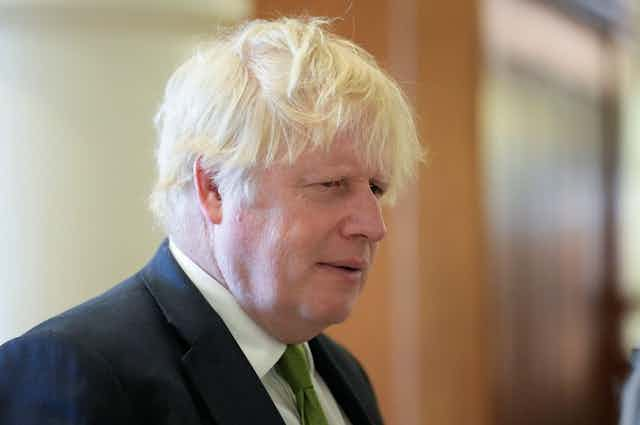In characteristically dramatic fashion, Boris Johnson let the world know he would be standing down as an MP by publishing a letter claiming he was the victim of a witch hunt and establishment stitch up. Ahead of the publication of a report looking at whether the former prime minister misled parliament over partygate, he went on the offensive against the committee that produced the document:
Their purpose from the beginning has been to find me guilty, regardless of the facts. This is the very definition of a kangaroo court.
Johnson’s anger is directed at the members of the House of Commons Committee of Privileges. Its role is to “consider matters relating to privilege”. When Johnson was accused of lying in parliament (either deliberately or inadvertently) over whether he participated in lockdown breaking events in Downing Street during the pandemic, and whether he knew about others breaking the rules, the House of Commons referred the accusation to this committee. Johnson repeatedly insisted that he did not know rules were being broken despite mounting evidence to the contrary.
Johnson could have decided to see off a plot against him as long ago as April 2022, when the process began. But he didn’t mount a challenge. Perhaps he realised it would not work. The motion was agreed. The government did not whip its MPs to vote against it and the then paymaster general Michael Ellis,told the house: “the Prime Minister has always been clear that he is happy to face whatever inquiries parliament sees fit to hold. He is happy for the House to decide how it wishes to proceed…”
The committee’s process
The privileges committee has seven members, all MPs. The government side has the majority. Labour MP Chris Bryant, who would normally have been the chairman of the privileges committee, recused himself over perceptions of bias and his Labour colleague Harriet Harman was appointed to take over. Conservative Laura Farris, who had previously been critical of Johnson, resigned from the committee (although her reasons were not clear at the time). She was replaced by Charles Walker.
The committee started its work collecting evidence and held a high-profile hearing with Boris Johnson himself agreeing to three hours of questioning.
And yet when the committee sent its almost final report to Johnson, he immediately claimed the whole process had been a “political hit-job” motivated by a desire for “revenge” for Brexit. He said that the committee, or more particularly Harman, has shown “egregious bias”.

It is hard to see a committee with an in-built Tory majority being part of a hit-job. Johnson was able to take and use legal advice through the process and we know that there were letters and challenges as part of that. It is even harder to see committee member Bernard Jenkin, an official campaigner for Vote Leave, participating in an anti-Brexit plot, regardless of his personal differences with Johnson.
‘Will of the people’
Johnson’s claim that he is being “forced out of parliament by a tiny handful of people” (which thereby implies they are acting against the will of the electorate) is particularly misleading. Under the 2015 Recall of MPs Act, it would have been Johnson’s Uxbridge and South Ruislip constituents who would have had the final say, had he not resigned. They would have been given the opportunity to sign a recall petition to have him removed and then, had that succeeded, they would have been given the chance to vote in a by-election in which he could have stood. He has removed himself from this democratic process.
In short, had he respected the processes of the parliament he once declared sovereign, he would have faced the will of the people. It is not for a committee of MPs to force him out and the committee of MPs did not itself presume to. Perhaps it was his fear of how the people would vote that prompted Johnson’s move.
The Institute for Government has commented that the partygate saga has served to underline the importance of ministers being truthful in parliament. But Johnson’s reaction, and that of some of his supporters, makes it look as if some politicians feel the rules do not matter. In the longer term that is a problem for democracy and for the way our institutions work.
In the wake of Johnson’s resignation, cabinet member Grant Shapps told the BBC that people don’t miss all the drama. associated with him. Conservatives are dreaming of a period of calm.
And while it is easy to see Johnson’s letter as a tantrum, it raises worrying issues. It highlights a belief in some quarters that the Brexit referendum vote “of the people” is being undermined by those “higher up”. This could exacerbate political polarisation and increase a distrust in politicians more generally. Johnson may be using the argument for effect. But we don’t yet know how that argument will be received.

